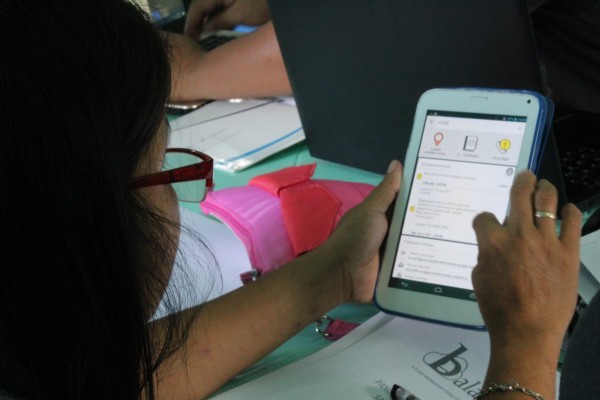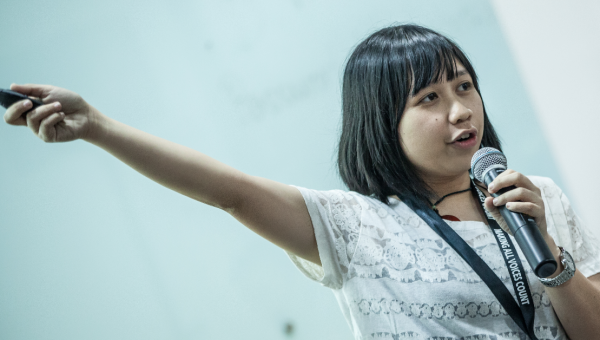In 2015-2016, Making All Voices Count partnered with Ignyte for the implementation of the innovation ‘Balangay’ in the Philippines, one of nearly 400 ideas submitted for the 2015 Global Innovation Competition.
Balangay is a cloud info system for disaster. It tries to address the information and knowledge gap between vulnerable communities and official government sources by making information understandable and simple and transmitted securely through a fast and user friendly interface.
We asked the project lead Frei Sangil -at age 25 today- about herself, what inspires her as a social innovator and what she has learned from her experience with Making All Voices Count.
Tell us about yourself…
My name is Maria Jihan Sangil but I’m more broadly known as Frei. It is actually my nickname since I used to have an alter ego - in games, stories, etc. - named Freyja. I used to be really quiet and shy with low grades at school so I would project Freyja to be a stronger and more fearless version of myself.
My parents were activists. My elder brothers are known to be very smart, so all of my life I’ve lived in the shadow of my second brother who is known in the city as a ‘math and science wizard.’ People would tell me that I should become a writer so I could write about my brother’s great achievements and as I was like… NO [laughs].
At high school, I’ve had my rebellious, ‘anarchist’ hacker phase but I became more serious with studies once I was in college.
What is your greatest strength and in what areas do you feel you could grow?
My greatest passion and, I think, strength is the technology development. I just love making things. I also love physics and if given the time and resources - like if I magically end up very rich- I would like to study nuclear and quantum physics. My first love was physics and learning about the universe, multiverse and stars. I had to translate my skills into information technology development because it’s more profitable work.
I am the kind of person who gets really engrossed in something. This can also be my biggest weakness because I am in danger of losing sight of some things (like profitability for example) but I learned to always trust other people to slap me back into reality from time to time. I get this all the time: I need mentoring in Business. But I think it is not the lack of capacity but the values I have that make me a bad ‘businesswoman’.
Although I am trying to look confident all the time, I can actually be pretty anxious. I would rather lock myself in a room and do science but the situation forces me to go out there. The contrast between how I am naturally, and the kind of image I am sometimes forced to project can be emotionally straining.
What learning have you incorporated in Balangay?
When you deploy a tech solution, the moment it goes out of the lab, it becomes 70% about the people and the environment that will use it. I never had to deal with this before. In the past, as long as I was making quality products it was up to the company to market them. But I was awakened to the reality that making people use your app, without having to force them, is a completely different challenge.
Before, I was very uncompromising when it came to the design of the technology. Now, we surely incorporate ‘roll-outs’ and certain flexibility in our proposals and activity plans. We also started becoming more sensitive to the capacity of the people who will use the tech solution. We started incorporating strategies on how to deploy the ideal technology - I’m still a hardcore tech person after all- but do it gradually so it won’t end up being an inconvenience instead.

Finally, we have placed a noticeably strong emphasis on educating and empowering the next generations, especially in the city of Legazpi. Having grown up in the province, we know that we have less resources, less opportunities and definitely less ‘prestige’ compared to young people with more ‘famous’ backgrounds. So we understand by heart the insecurities they feel and the things that limit them from pursuing their ideas and innovations. So the same way we were mentored, we feel the need to give it back somehow by helping them.
We know that for our hard work to live on and improve, the next generation must be ready to pick it up and continue from where we left it. Then all our struggles, sacrifices and learning will not be wasted.
That’s why we encourage students to pursue their own innovations, so that the entire city culture will grow, there will be healthy competition, more innovations will spring up, more ideas and the designs we worked so hard on will end up becoming better than what we had imagined. That is the best thing an innovator can ever ask for.
In your opinion, what change is Balangay contributing to?
I think the best word to describe it is disruption. It caused a disruption in the city, sparking both positive and negative reactions. Surely though, the local government officials we engaged with became more open to innovation, a bit more convinced to try something new, to explore and open their doors to people who they least expected to be of help to them – like students and young professionals.
Since we’re working with youth, we can see young people getting more involved, reaching out to government and sending in even their own proposals.
We also focused on collaboration, which ended up being a bit of a buzzword here. Before, the different sectors worked in silos and even if they did collaborate only those who are really influential could take a seat at the table. Now more they are open to engaging with SMEs, like us!
What challenges have you and your team experienced so far?
Post-Making All Voices Count Funding. But we also attribute the limitation of funding to one of the factors that made the project a success. Why? Because when you have stable funding, chances are, you get more relaxed and secure. But when resources are limited, you are sort of forced to be more creative and aggressive because you love your project, you love your team, you want to do everything so your efforts won’t go to waste.
Age. Legazpi is still a more traditional and conservative provincial city. Being in our 20s, it is extremely difficult to prove to local officials that what we are doing… actually works. So we had to be ‘aggressive’ in presenting and pitching our innovation to the right people and connecting with the local champions.
Based on your learning from Balangay, what recommendations would you share with other social innovators?
- Start small and specific. Perfect the technology (at least to a certain extent), and then slowly, scale it up, or in some cases, replicate it. As much as possible do it gradually and if ever you scale out, its best to do it one at a time and focus on building strong links between pilot areas so that they can collaborate.
- Integrate sustainability in the entire implementation strategy. As much as possible, go 10-20-100 years in the future and ask yourself how you want this to impact humanity. This is our team’s mental exercise, we dream about how we can see ourselves in history books someday and what kind of reputation we want to have.
- Appreciate bad comments. Especially now that we are closely working with the government, we always hear bad comments in the hallways about how we are amateurs, too ambitious and how we won’t succeed. Of course, the initial reaction is to get defensive but you’ll realize that it is more useful to take note, listen to them and make sure you don’t prove them true.
What are your plans for the future?
My team and I really want to continue Layertech (the initial company before Ignyte). We need to continue being a business in order to pay our rent, the salary of employees, the operating expenses… so we decided to stick to business. But now that we are also working with the government we have a certain level of influence which enables us to uphold our values by speaking up - and thankfully they are listening to us.
What is your message to other ambitious innovators?
This may sound a bit morbid but the moment you realize that your time in this world is unsure and limited, you get to have a clearer picture of what kind of person you want to be and what kind of fingerprints you want to leave in this world. Your work is your fingerprint. Personally, I have many limitations as a human, so I want my work to outlive me, do the things I couldn’t do, help the people I couldn’t help, do something about the injustices I couldn’t stop in fear of my own safety.
And when you think about the things that really matter, it gets so much easier to not give up, endure struggles, cast away your pride and listen to criticism, seek out and accept help from people.
